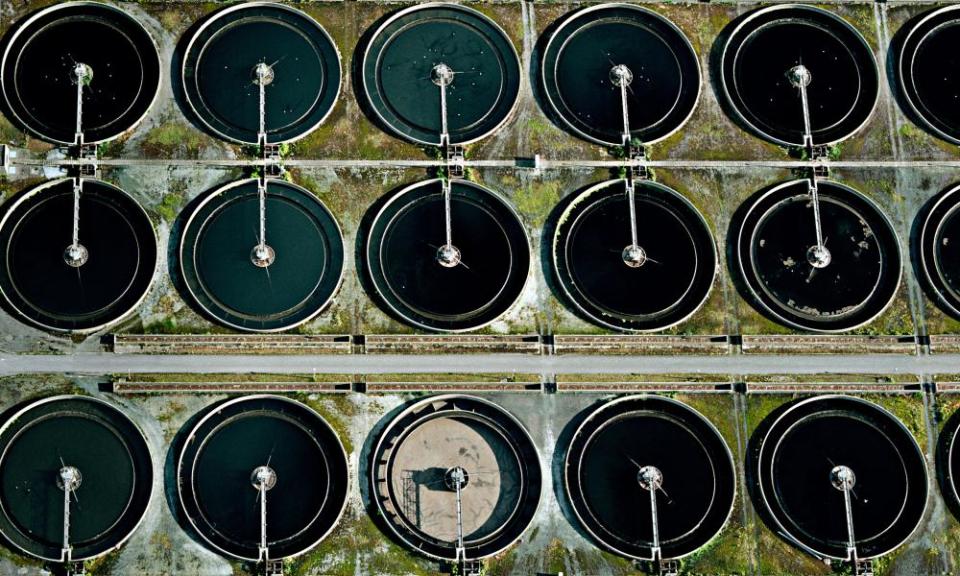Water firms in England urged to upgrade sewage works for new homes

Campaigners are intervening to prevent new houses being occupied in several areas of England until sewage treatment works are upgraded to cope.
In Oxfordshire, the Cotswolds and in Cumbria, the failure of water companies to invest in sewage infrastructure means new homes would just add more sewage into treatment works that are at or beyond capacity, and increase pollution into rivers, they say.
The move comes as the regulator Ofwat continues its investigation into water companies for what it says are shocking failures in the way they run their treatment works and for potentially illegal dumping of raw sewage.
Charlie Maynard, a Liberal democrat councillor on West Oxfordshire district council, said: “The sewage treatment infrastructure owned by Thames Water is just not there to support existing housing let alone new developments.
“We have to do something, but at the moment there isn’t any serious plan nationally as to what we are going to do about this massive underinvestment by water companies in sewage treatment works.
“For 30 years there have been wonderful dividends for investors from water companies, but these dividends should have been invested in our sewage systems.”
As a result of pressure from Windrush Against Sewage Pollution (Wasp), councillors in West Oxfordshire have pushed for so-called Grampian conditions on developments, which state that they must not be occupied until Thames Water has invested to upgrade sewage treatment works to cope. A Grampian condition means a restriction is placed on a development until certain conditions have been met.
Thames Water has included a condition on the development of 150 new homes in Long Hanborough to state no development should be occupied until confirmation that all sewage work upgrades required are completed or there is a phasing plan agreed to allow the development to be occupied.
Another 40 homes in North Leigh will have a similar Grampian condition, which states that they must not be occupied until the Church Hanborough sewage treatment works is upgraded to cope.
The West Oxfordshire area has a government target to build more than 10,450 new homes by 2031. But Maynard said the sewage infrastructure was a “wasteland” – treatment works were unable to cope with the current population, and pipe networks desperately needed investment to stop groundwater ingressing into the system and further overloading it.
In Cumbria, local conservationist Matt Staniek is calling for a Grampian condition to be imposed to stop the occupancy of 40 new homes at Loughrigg until Ambleside sewage treatment works has been upgraded.
Staniek, who set up the Save Windermere campaign, argues the lake could become ecologically dead because of the amount of sewage being pumped into it.
Staniek said in his submission to the Lake District national park that without the upgrade of Ambleside treatment works to make sure it is operating legally within its environmental permit, granting consent for the development would endorse its intermittently illegal operation and increase the spilling of untreated and poorly treated sewage into the lake.
“In the last few years, I have observed the sharp and sudden degradation of our rivers and our lake,” said Staniek. “With dead fish floating in the lake, tributaries and algal blooms suffocating Windermere, it’s hard to ignore.
“I believe that the biggest contributor to the current decline of Windermere is the water company United Utilities, who service the local area.”
In 2021, there were more than 5,000 hours of raw sewage discharged from United Utilities’ wastewater treatment works into the Windermere catchment, according to data submitted by the water company to the Environment Agency.
Lake Windermere is judged to be at only moderate ecological status under the Water Framework directive, which measures pollution. Significant phosphate pollution from sewage discharges is cited as the reason for not achieving good status.
“The impact of this is being felt across Cumbria – from the businesses that rely on the tourism that our lakes and rivers encourage to the health implications that swimming in polluted water has on those seeking to use it,” said Staniek.
Ashley Smith from Wasp, which has made 13 submissions regarding sewage capacity and new developments in West Oxfordshire and the Cotswolds, said: “The idea that new housing is routinely nodded through to join inadequate sewage works by planners and water companies will shock most people.
“That some of those works will even be operating illegally yet ignored by all of the authorities supposedly acting in the public interest is a step too far and that is why Wasp is working with local councillors to end this money-making scam on the public.
“We are not aiming to hold up housing – we are aiming to force water companies to spend money when they should, not hang on to it for years after it was due.”
A Thames Water spokesperson said: “Over the last five years we have requested planning conditions for waste networks and/or waste treatment at 27 sites in West Oxfordshire. In addition, we are currently reviewing our advice on a small number of additional sites, at the council’s request.”
A United Utilities spokesperson said: “In 2020 we completed a multimillion pound upgrade at Ambleside WwTW [wastewater treatment works] which has raised the standard of treatment and ensures it has the capacity for growth from development and tourism up until 2036.”

 Yahoo Movies
Yahoo Movies 